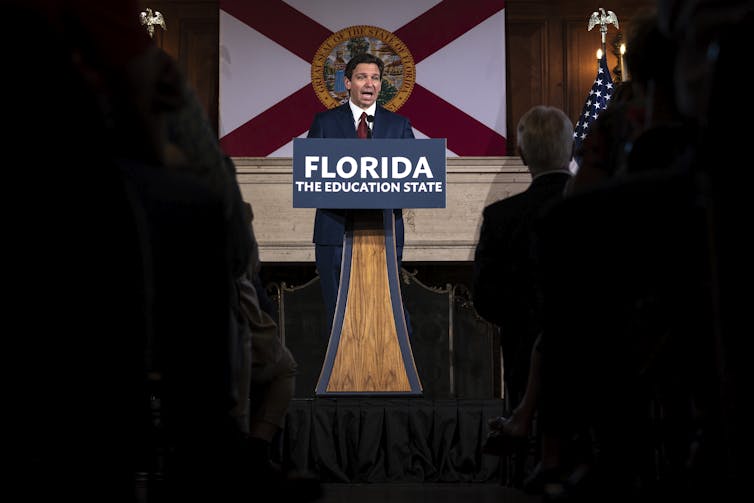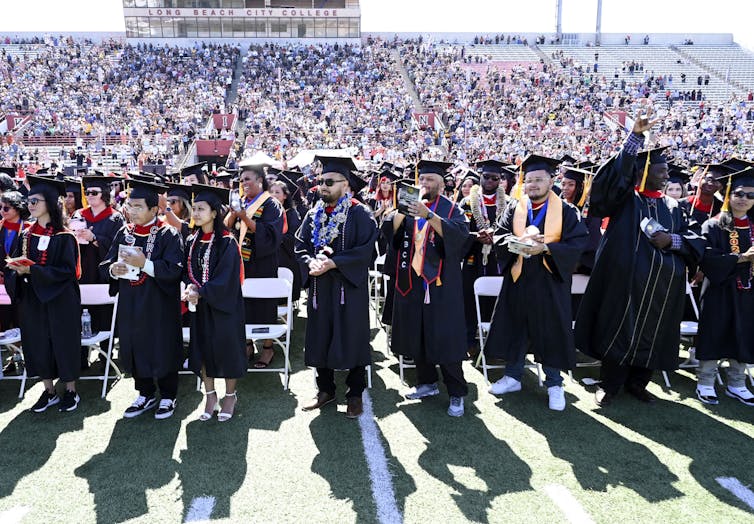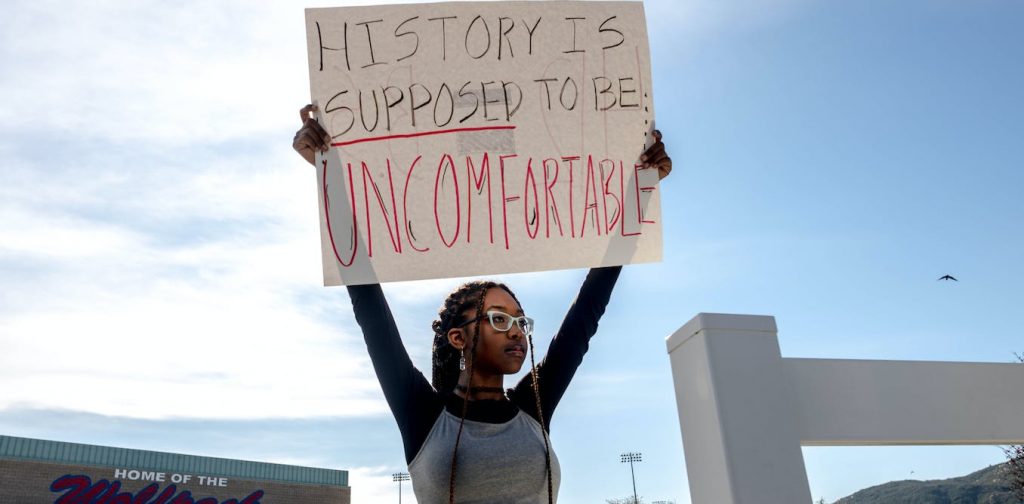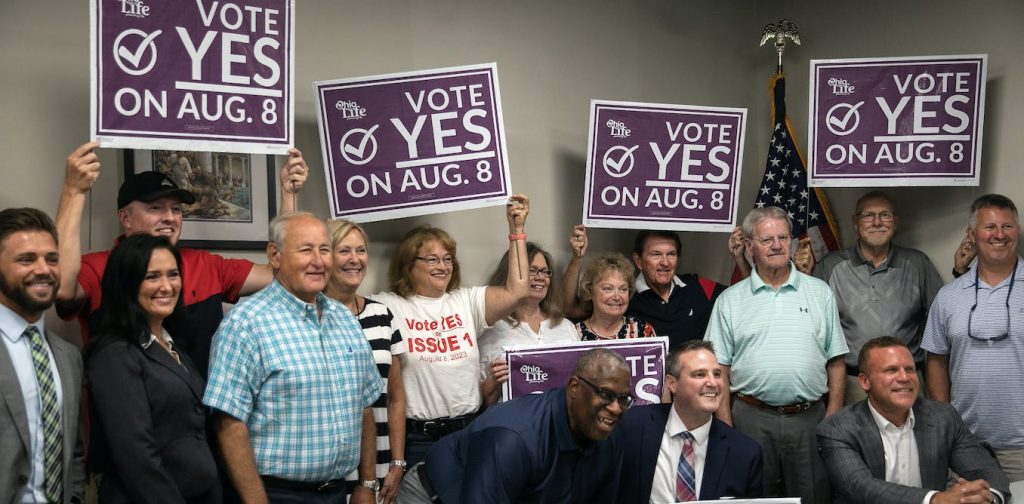Saying that students embrace censorship on college campuses is incorrect — here’s how to discuss the issue more constructively

The claim that college students censor viewpoints with which they disagree is now common. Versions of this claim include the falsehoods that students “shut down” most invited speakers to campuses, reject challenging ideas and oppose conservative views.
Such cynical distortions dominate discussions of higher education today, misinform the public and threaten both democracy and higher education.
Indeed, politicians in states such as Florida, Texas and Ohio argue that a so-called “free speech crisis” on college campuses justifies stronger government control over what gets taught in universities.
Since 2020, numerous state legislatures have attempted to censor forms of speech on campuses by citing exaggerations about students and their studies. Passing laws to ban certain kinds of speech or ideas from college campuses is no way to promote true free speech and intellectual diversity. The most common targets of such censorship are programs that discuss race, gender, sexuality and other forms of multiculturalism.
My concerns over public discourse about higher education extend from my book on popular misinformation about universities and why it threatens democracy. In it, I show that many negative perceptions of students and universities rest on factual distortions and exaggerations.
The character of public debates about higher education is important. Millions of Americans rely on a healthy system of university education for professional and personal success. Rampant cynicism about higher education, leading to declines in public support for it, only undermines their pursuits.
Based on my research, I offer alternative ways to frame debates about higher education. They can lead to discussions that are more constructive and accurate while better protecting fundamental American values such as free speech and democracy.
 One bill signed in May 2023 by Florida Gov. Ron DeSantis, center, includes restrictions that bar public colleges in Florida from spending money on diversity, equity and inclusion programs. Thomas Simonetti for The Washington Post via Getty Images
One bill signed in May 2023 by Florida Gov. Ron DeSantis, center, includes restrictions that bar public colleges in Florida from spending money on diversity, equity and inclusion programs. Thomas Simonetti for The Washington Post via Getty Images
1. Avoid stereotypes about college students
The idea that college students are hostile to opposing viewpoints is false. Pundits and media personalities have promoted this falsehood aggressively. Such figures have benefited, politically or financially, from sensationalism about a college “free speech crisis.”
In opinion polls, college students typically express stronger support for free speech and diverse viewpoints than other groups. Partisan organizations often cherry-pick that data to make it seem otherwise. But poll results tell only part of the story about college campuses today.
Several thousand institutions make up U.S. higher education. The system includes hundreds of thousands of students from different backgrounds. College campuses are often more demographically and intellectually diverse than surrounding communities.
Judgments about higher education based on sweeping generalizations about college students conflict with the full realities of campus life. A wider range of perspectives, including from students themselves, can enrich debates about university education.
2. Consider all forums for free speech in universities
Universities protect free speech more effectively than do other parts of society. They don’t do so perfectly, but more effectively.
Universities are major centers for the study of the First Amendment, the free press, human rights, cultural differences, international diplomacy, conflict resolution and more. Many institutions require students to take basic speech and writing courses that enhance their skill in argument and debate.
Manufactured outrage about college students who protest invited speakers fuels sensationalism about free speech on campuses. Despite occasional disruptions over bigoted speakers, universities offer numerous forums for free speech, open debate and intellectual diversity.
Just one large university holds thousands of classes, meetings, performances and other events on a daily basis. People freely express their views and pursue new ideas in those settings. Now multiply that reality by several thousand different institutions.
Debates over free speech in higher education can be improved by acknowledging the many forums in which people speak freely every day.
3. Recognize the true threats to free speech on campuses
For the past several years, many state legislatures have promoted the falsehood that universities are hostile to various ideas. The most commonly cited examples are conservative ideas, traditional expressions of patriotism and great works of Western literature.
The notion of hostility to such ideas on college campuses has surfaced in numerous bills that create new forms of state interference in education. Thirty-five pieces of legislation banning diversity, equity and inclusion programs in colleges have been introduced in state legislatures. So far, three of them have been signed into law, while four are pending final legislative approval.
Tenure for faculty members, which protects independent thought, is also under assault in states such as Florida and Texas. Politicians in those states justify ending tenure protections by claiming that professors teach students to censor free speech.
Such rising government interference creates a genuine threat to free speech on college campuses and in society beyond. A historic increase in state censorship, which began with higher education, has spilled over into censorship of materials about race, gender, sexuality and multiculturalism in K-12 schools and public libraries.
Advocacy organizations like the ACLU and the American Association of University Professors have condemned this censorship. So have numerous conservative leaders.
Informed scrutiny of university policies and what faculty members teach is always welcome. But cynical distortions have fueled anti-democratic censorship of universities, not constructive efforts to improve them.
4. Understand the role of academic freedom
 Academic freedom isn’t a luxury found only in the Ivy League. It exists at community colleges such as Long Beach City College in California, whose June 9, 2022, graduation ceremony is seen here. Brittany Murray/MediaNews Group/Long Beach Press-Telegram via Getty Images
Academic freedom isn’t a luxury found only in the Ivy League. It exists at community colleges such as Long Beach City College in California, whose June 9, 2022, graduation ceremony is seen here. Brittany Murray/MediaNews Group/Long Beach Press-Telegram via Getty Images
The ability of citizens to exercise academic freedom is not only vital in education. It’s also training for democracy.
Academic freedom includes the freedom to attend a university of one’s choice. The freedom to learn what one chooses in that university. The freedom of an institution to offer a wide range of subject matters to students. And the freedom to teach or conduct research without political interference.
These freedoms are not reserved for Ivy League universities. U.S. higher education includes state schools and community colleges that serve middle- and working-class communities. Those institutions are the backbone of many professions, from health care and technology to engineering and education.
The quality of public debate over free speech in higher education matters. Government interference with colleges does not punish elites. It rewards deeply cynical views of higher education and restricts a freedom that should be available to all Americans.





